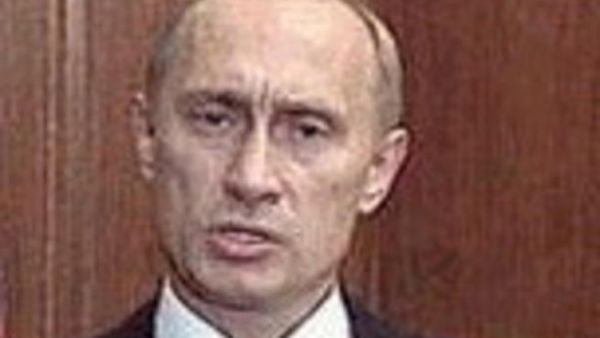Under intense international Jewish pressure, Russia has ended an investigation into claims of incitement in Jewish text.
Russia's state prosecutor announced that he is canceling an investigation into claims that a 16th century abridged code of Jewish law contains incitement against non-Jews.
The preliminary investigation of the Jewish umbrella organization for distributing a Russian translation of the text has also been dropped, also – as a result of immense Jewish pressure.
"There's no reason to persecute a whole sector of society because of religious texts held sacred to them. The decision to launch an investigation was a mistake," said a source at the attorney general's office.
The report of the investigations triggered widespread expressions of concern from Israel as well as Jewish and human rights groups worldwide.
The decision to cancel the probe came following a meeting between Israel’s Deputy Prime Minister Ehud Olmert and Russian Prime Minister Mikhail Fradkov.
Olmert, who was on an official state visit to Russia, told Fradkov that Israel expects Moscow to take substantial steps to fight "anti-Semitism" in the country, and not suffice with verbal condemnations.
In a personal letter to Putin, the head of the Anti-Defamation League (ADL), Abe Foxman, wrote that the probe evoked the anti-Semitic persecution of the Stalin era.
Israeli and Jewish officials, human rights activists and Russian journalists have spent the last weeks trying to understand what has caused the prosecutor to order the preliminary investigation of the Jewish umbrella organization for distributing a Russian translation of the "Kitzur Shulchan Aruch" (which means – Abbreviated Prepared/Set Table).
Investigation ordered
In January, the Russian state prosecution was asked in a petition to open an investigation into the Jewish organizations in Russia suspected of spreading hate via their sacred texts. An estimated 500 people signed the petition, about 20 of whom are members of the Duma, Russia's lower house of parliament.
Those who submitted the petition retracted it and submitted a second one about a month later, this time with 5,000 signatures. In their complaint, the activists argued the text is aimed at "insulting human dignity based on national and religious affiliation." The text was also accused of labeling Christians "worshippers of idols" in a reference to Christians' main religious symbol, the cross.
On June 10, the prosecution said the Kitzur Shulchan Aruch is injurious to the feelings of non-Jews, but that there was no reason to open a criminal investigation against the Jewish group that distributed the book. But afterwards, the chief prosecutor of Moscow called for a renewed assessment of the case.
Around two weeks ago, attorneys from the Russian State Prosecutor's Office questioned Rabbi Zinovy Kogan, chairman of the Congress of Jewish Organizations - one of the two large Jewish umbrella organizations in Russia.
Kogan was asked to explain the contents of Shulchan Aruch, especially regarding its treatment of non-Jews. During his probe, he acknowledged that there are "some incorrect passages" in the text, such as an instruction for Jewish women without a medical education not to help non-Jewish women during child birth. But he said such statements from a very ancient text could not be interpreted without an appropriate commentary.
Alexander Boroda, the president of the Federation of Jewish Communities told a Russian news agency, "We are shocked by the very examination. The fact that books from the 16th century, which have become part of Jewish heritage, are subject to investigation shows the short-sightedness of the state prosecutor's people."
Rodina
Most of the Russian lawmakers who signed the letter were representatives of Rodina, a nationalist party and one of the four Russian political parties currently represented in the Russian parliament.
On his part, the leader of Rodina, Dmitry Rogozin, wrote a letter to Pinchas Goldschmidt, Moscow’s chief rabbi, distancing himself from the members of his party who signed the letter.
Rogozin, whose party has been gaining strong popularity since it was founded a few years ago, wrote that in his party’s opinion, theological sources cannot serve the basis for legal prosecution of anyone regardless of faith, including Jews.
He said he regretted that the letter was signed by members of his party and condemned anti-Semitism and xenophobia. Goldschmidt welcomed the letter.
Some sources, however, insist that the entire issue of anti-Jewish atmosphere is artificial and created to serve political interests. According to them, Russian president Vladimir Putin has been trying to drag the so called "religious anti-Semitism" into Russian political life in order to cement his position among Western leaders ahead of the parliamentary election, due in late 2007 and signal to them he was the only one who can cope with this issue. "Israel and the Jews have already jumped on the bandwagon," they said.
Shulchan Aruch
The Shulchan Aruch was compiled by Rabbi Joseph Karo in the mid-16th century and is considered to be the authoritative text on Jewish law. The Shulchan Aruch by Karo is considered the most authoritative compilation of Jewish law since the Talmud. The Talmud is regarded as an authoritative record of rabbanic discussions on Jewish law, Jewish ethics, customs, legends and stories.
With its commentaries, the Shulchan Aruch is the main authoratitive source of halacha (Jewish law and custom) and often referred to as the Code of Jewish Law.
© 2005 Al Bawaba (www.albawaba.com)







